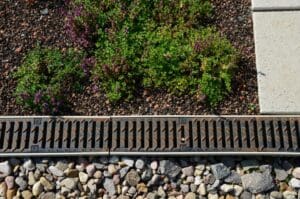- Poor drainage can lead to soil expansion, contraction, and erosion, causing foundation instability.
- Common signs of poor drainage include water pooling near the foundation, damp basements, and mold growth.
- Effective drainage solutions include installing gutters, downspouts, proper grading, and French drains.
- Regular maintenance like gutter cleaning and inspections helps ensure drainage systems function properly.
- Professional assessments and installation can help prevent long-term foundation damage due to poor drainage.
Proper drainage is essential for maintaining the health and stability of a home’s foundation. Without adequate drainage, water can accumulate around the foundation, leading to significant structural damage over time. Poor drainage can result in costly repairs for homeowners, as water can erode the soil, cause foundation shifting, or even infiltrate the foundation itself.
How Water Affects Foundations
Water can have a direct and detrimental impact on the foundation of a home. The most common issue is soil expansion and contraction due to changes in moisture levels. When the soil around the foundation becomes saturated with water, it expands, pushing against the foundation and causing pressure. When the soil dries out, it contracts, leading to gaps or voids that can cause the foundation to settle unevenly.
Excessive water runoff can erode the soil around the foundation, weakening its support and potentially causing shifts or cracks. Water can then seep into the foundation through cracks or porous areas, weakening the structure over time. This moisture can also lead to mold growth and a damp, unhealthy basement.
Signs of Poor Drainage
There are several signs that indicate a home may have poor drainage and addressing them promptly can help prevent foundation damage.
- Water Pooling: One of the most visible signs is water pooling near the foundation after rainfall. This can indicate improper grading or a lack of effective drainage systems.
- Damp or Wet Basement: If your basement or crawl space is frequently damp or wet, this could be a sign that water is seeping into the foundation.
- Mold Growth: Mold growth inside the home, especially in the basement, is often a result of excessive moisture caused by poor drainage.
Addressing these signs as soon as they appear is crucial to prevent long-term damage to the foundation.
Effective Drainage Solutions
Improving drainage around a home is one of the best ways to protect the foundation from water damage. There are several methods homeowners can use to ensure proper drainage:
- Gutters and Downspouts: Properly installed gutters and downspouts are essential for directing water away from the foundation. Downspouts should extend several feet away from the home to prevent water from pooling near the foundation.
- Grading: Ensuring that the ground slopes away from the foundation is crucial for preventing water from flowing toward the house. A slight slope can help direct water away and reduce the risk of foundation damage.
- French Drains: Installing a French drain can help collect and redirect water away from the foundation. These underground drains are highly effective for areas prone to heavy rain or flooding.
- Landscaping: Thoughtful landscaping can also help direct water away from the foundation. Avoid planting water-intensive plants too close to the house, and consider using mulch or gravel to absorb excess water.
Maintaining Drainage Systems
Once drainage systems are installed, regular maintenance is essential to ensure they continue functioning properly.
- Gutter Cleaning: Gutters should be cleaned regularly to prevent blockages that can cause water to overflow and pool near the foundation. Downspouts should also be inspected to ensure they are directing water away from the home.
- Inspections at the First Sign of Foundation Damage: Inspections of the home’s drainage systems are important to catch any issues early. Homeowners should check for signs of water pooling, basement moisture, and clogged drains.
- Seasonal Maintenance: In areas prone to heavy rainfall or snow, additional maintenance may be required during wet seasons. Ensuring proper drainage during these times can help prevent water from seeping into the foundation.
Professional Assessment
For homeowners who are unsure about the condition of their drainage system or suspect there may be issues, seeking a professional assessment is a wise step. A drainage professional can evaluate the specific needs of the property and recommend the most effective solutions, such as French drains, grading adjustments, or gutter systems. Professionals can also perform routine maintenance, ensuring that all drainage systems are functioning optimally and helping to prevent long-term foundation damage.
Protecting Your Foundation with Proper Drainage
Proper drainage plays a vital role in preventing foundation damage. By managing water flow around the home and ensuring that water is directed away from the foundation, homeowners can protect their property from costly structural issues. Taking proactive steps, such as installing gutters, maintaining grading, and seeking professional advice, can help ensure long-term foundation stability. Homeowners should regularly inspect their drainage systems and address any issues promptly to avoid damage to their foundation.

